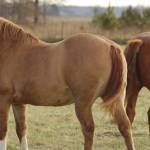Weight Loss Management in Obese Horses

With equine obesity on the rise, many horse owners have heard the same advice from their veterinarians: “You need to get some weight off this horse.” Decreasing dietary intake and increasing exercise are time-honored management strategies to induce weight loss, but in spite of an owner’s best efforts along these lines, some horses seem determined to stay as chubby as ever.
A study conducted by British researchers investigated weight loss in 12 overweight horses and ponies for a period of 16 weeks. The equines were randomly divided into two groups. Animals in both groups were given diets in which daily dry matter intake was restricted to 1.25% of body weight. All animals ate almost the same number of calories, but one diet consisted of hay and chaff-based feed while the other diet was made up of hay and a nutrient balancer.
All subjects lost weight during the trial, and indices of insulin resistance improved for 9 of the 12 horses by the end of the study. Weight loss varied widely among the equines, with some losing as much as 0.55% and others losing only 0.16% of body weight in the first week. Predicted weight loss rates decreased as the study progressed. Weight loss percentages were highly individualized and did not correlate to diet or to pre-study body mass, body condition score, heart girth, belly circumference, or other measurements.
The researchers concluded that forage dry matter intake should be restricted to 1.25% of body weight in obese equines. For those particularly resistant to weight loss, intake at a rate of 1% might be warranted. Because severe dietary restriction can cause serious or fatal metabolic problems in some equines, owners should consult an equine nutritionist before severely reducing intake in their horses.








